|
|
|
Sort Order |
|
|
|
Items / Page
|
|
|
|
|
|
|
| Srl | Item |
| 1 |
ID:
131147
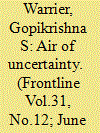

|
|
|
|
|
| Publication |
2014.
|
| Summary/Abstract |
Environment minister Prakash Javadekar will not have to worry about pressures from alliance partners. But one does not know how much space he is willing to carve out for himself and how much space the government is likely to give him.
|
|
|
|
|
|
|
|
|
|
|
|
|
|
|
|
| 2 |
ID:
162602


|
|
|
|
|
| Summary/Abstract |
Professor Alan Maynard applied both his wit and wisdom to the analysis of health care and health policy for over five decades. As a leading health economist, he made an immense contribution to the analysis and understanding of many of the key issues that are still at the heart of the current debates about the National Health Service. His academic interests were wide ranging, including health systems and reform, performance, workforce, regulation, public health and the pharmaceutical industry. Alan's natural ability to communicate with varied audiences established the relevance of health economics thinking and language to policy and practice, both nationally and internationally.
|
|
|
|
|
|
|
|
|
|
|
|
|
|
|
|
| 3 |
ID:
176213


|
|
|
|
|
| Summary/Abstract |
Much recent literature has examined the correlates of anti-vaccination beliefs, without specifying the mechanism that creates adherence to these debunked ideas. We posit that anti-vaccination beliefs are an outcome of a general psychological propensity to believe in conspiracies based on new research on the interconnectedness of conspiracy beliefs. These ideas are tested with a confirmatory factor analysis and a seemingly unrelated regression (SUR) model of a nationally representative U.S. sample from the 2016 American National Election Studies. The confirmatory factor analysis shows that anti-vaccination beliefs highly correlate with belief in the unrelated conspiracies that Obama is a Muslim and 9/11 trutherism. Our SUR models also show that all three of these very different beliefs have similar predictors. All three have a negative correlation with political trust, political knowledge, education, and a positive correlation with authoritarianism. Thus, anti-vaccination beliefs are shown to be part of a psychological propensity to believe in conspiracies
|
|
|
|
|
|
|
|
|
|
|
|
|
|
|
|
| 4 |
ID:
106704
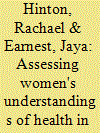

|
|
|
| 5 |
ID:
174743
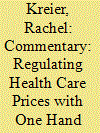

|
|
|
|
|
| Summary/Abstract |
Last year in this journal, I offered an explanation for America’s high health care costs rooted in the concept of “supply-side moral hazard,” and advocated for an all-payer system of price regulation as an appropriate policy response. The good news—particularly in the current time of pandemic—is that politicians and health services researchers are beginning to acknowledge the need for some form of price regulation. Legislative proposals thus far have focused narrowly on pharmaceutical prices and “surprise billing” for out-of-network charges. However, a few months ago, in March 2020, three Harvard researchers released a more comprehensive proposal. The bad news is that the proposal would preserve a large role for market forces, which, I argue here, amounts to going into battle against high health care costs with one hand tied behind your back. Furthermore, the reliance on private markets would lock in place the rampant inequality and Byzantine complexity bedeviling American health care.
|
|
|
|
|
|
|
|
|
|
|
|
|
|
|
|
| 6 |
ID:
186877


|
|
|
|
|
| Summary/Abstract |
While South Africa–China relations were only formalized in 1998, relations between these states date back to the 1800s. South Africa's quest for sustainable development through partnerships with global powers motivated its close ties with China. The 2015 Cape Town Declaration committed the two countries to improve health facilities and disease control. The coronavirus (COVID-19) pandemic presents an opportunity to rethink this partnership. Drawing on desktop research, this article engages the reality of COVID-19 and explores South Africa–China relations in the context of the pandemic. The emergence of the virus in China, its rapid spread, and the high fatality rate have had devastating repercussions across the world. This article argues that Beijing's response to COVID-19 raises more questions than it answers. The outbreak of the virus in China, its response, and emerging cases of racism and xenophobia against Africans in China also raise concerns about the future of South Africa–China relations.
|
|
|
|
|
|
|
|
|
|
|
|
|
|
|
|
| 7 |
ID:
184172
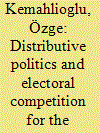

|
|
|
|
|
| Summary/Abstract |
Competition for the Kurdish vote has been important in contemporary Turkish politics. Focusing on the non-contributory health insurance program in the early period of AKP rule, this article shows that this competition also affected the distribution of benefits. Kurdish citizens’ likelihood of holding a Green Card increased with the competitiveness of the district between the AKP and Kurdish-oriented parties. The number of Green Cards and social spending were also higher when a Kurdish-oriented party posed an electoral challenge. These findings reveal the electoral calculation behind AKP’s strategy of favoring Kurdish voters as well as the importance of political organization for the minority group’s access to benefits.
|
|
|
|
|
|
|
|
|
|
|
|
|
|
|
|
| 8 |
ID:
111170
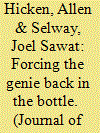

|
|
|
|
|
| Publication |
2012.
|
| Summary/Abstract |
In 2007, those behind the 2006 coup drafted a new constitution specifically aimed at turning back the political and policymaking clock to the pre-1997 era. However, in the preceding decade a significant transformation of Thai politics had taken place. Specifically, social cleavages had become politicized and particized in ways we have not seen before, and policy-focused, popular party programs had become part and parcel of serious party campaign strategies. Focusing on health policy, we thus argue in this article that institutional reforms have had predictable and observable implications for policymaking in Thailand, but only when considered in the context of changes to the broader social structure and other political conditions. While the 1997 reforms brought about a well-documented shift toward a more centralized, coordinated, and nationally focused policymaking environment, the 2007 reforms have been less successful at reversing that impact. In short, the coup makers are finding it harder than they supposed to force the genie back into the bottle.
|
|
|
|
|
|
|
|
|
|
|
|
|
|
|
|
| 9 |
ID:
087535
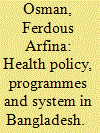

|
|
|
|
|
| Publication |
2008.
|
| Summary/Abstract |
Despite being a resource poor country, Bangladesh has achieved impressive health gains which make it an example for other developing countries. Over the last decades key health indicators like life expectancy and coverage of immunisation have improved significantly while infant mortality, maternal mortality and fertility rates have dropped considerably. But most of these achievements are mainly quantitative while qualitative improvement is negligible. Poor access to services, low quality of care, high rate of maternal mortality and poor status of child health still remain as challenges of the health sector. This article reviews the health programmes undertaken since independence and the system itself to see which aspects of the policy have contributed to these achievements and challenges. The findings show that the healthcare plans and policy have actually helped to expand services causing quantitative advances while managerial weaknesses and governance problems are the main factors inhibiting qualitative improvement. Finally, the article puts forward some suggestions to address these challenges.
|
|
|
|
|
|
|
|
|
|
|
|
|
|
|
|
| 10 |
ID:
124894
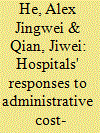

|
|
|
|
|
| Publication |
2013.
|
| Summary/Abstract |
The patterns of hospitals' behavioural changes in response to different insurance systems and payment arrangements have been well documented in the literature on health economics and policy. To understand these changes, it is necessary to look at the shifts in fundamental economic incentives. Meanwhile, hospital practices are also subject to adjustment when administrative tools are realigned. This article examines the dynamics of a health policy campaign started in 2005 by a Chinese provincial health administration that was committed to containing health expenditures using administrative measures. Through a combination of qualitative in-depth interviews and quantitative panel data analysis comprising 30 public hospitals in the sample, this article finds that by revising the structure of administrative measures on the supply side, the Chinese health bureaucracy is able to curb rapid cost inflation in the short term. However, while having to meet the cost control mandate imposed by the health administration, Chinese public hospitals still managed to defend their economic interests by engaging in various unintended opportunistic behaviour. This article analyses a panel database from Fujian province and reveals the strategies adopted by public hospitals and considers their implications for China's ongoing national healthcare reform.
|
|
|
|
|
|
|
|
|
|
|
|
|
|
|
|
| 11 |
ID:
110586
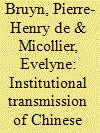

|
|
|
|
|
| Publication |
2011.
|
| Summary/Abstract |
The aim of this article is to propose a typology of the different issues that the transmission of traditional Chinese medicine encounters today in the world, by successively highlighting ideological, epistemological, political, and educational difficulties. After showing how much the polarised aspect of the debates on Chinese medicine is already entrenched among specialists in this discipline, we explore the question of the epistemological status of this Chinese tradition by confronting it with the dominant biomedicine of Western origin. The originality of Chinese structures that were set up to protect and promote this national tradition is then highlighted as a possible source of inspiration at the international level, before describing the different economic factors likely to play a positive or negative role in the development of this medical and cultural heritage at the local level. Finally, the specific didactic questions that the transmission of this heritage and the teaching of this discipline raise are analysed before presenting a conclusion.
|
|
|
|
|
|
|
|
|
|
|
|
|
|
|
|
| 12 |
ID:
148517
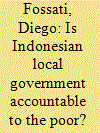

|
|
|
|
|
| Summary/Abstract |
Since decentralization in 2001, Indonesian local governments have acquired a key role in poverty alleviation and social service delivery. The extent to which they have been able to meet this challenge is subject to debate, however, and systematic analysis of policy outcomes remains scarce. This paper contributes to the literature with a study of the district-level implementation of Jamkesmas, Indonesia's free healthcare program for the poor. Using original data on policy implementation, I show that local government is to some extent responsive to the needs of the most vulnerable. In years when local elections (pilkada) are implemented, low-income households are targeted more accurately, suggesting that electoral incentives for local elites may increase access to social services among the poor. However, I also show that the positive effect of local direct elections is limited to districts with electorally competitive politics.
|
|
|
|
|
|
|
|
|
|
|
|
|
|
|
|
| 13 |
ID:
130432
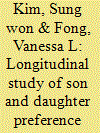

|
|
|
|
|
| Publication |
2014.
|
| Summary/Abstract |
In this mixed-method longitudinal study, we examined the continuity of son preference and daughter preference from adolescence to adulthood, and investigated how perceptions of gender equity shape these preferences among 2,273 youth born in Dalian between 1979 and 1986 under the one-child policy. The majority expressed no preference in adolescence or adulthood. Results from multivariate analysis and the narratives of 23 participants revealed that child gender preferences in adolescence were predictive of later preferences in adulthood. Furthermore, in adolescence, child gender preferences were associated with individuals' beliefs about gender as manifested in their attitudes towards women and employment, as well as their perceptions of parental and social gender biases against women. Our findings suggest that increasingly gender-egalitarian attitudes in urban China shape the child gender preferences of singleton youth in adolescence, and are likely to contribute to their later childbearing decisions, with important social and demographic implications.
|
|
|
|
|
|
|
|
|
|
|
|
|
|
|
|
| 14 |
ID:
193008
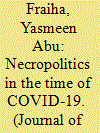

|
|
|
|
|
| Summary/Abstract |
The COVID-19 pandemic reached all parts of historic Palestine around the same time, but by the end of December 2021, only 29.02 percent of Palestinians in the West Bank and Gaza were fully vaccinated compared to 63.82 percent of Israelis (including Palestinians with Israeli citizenship). The mortality rate from COVID-19 in the West Bank and Gaza was also higher, with 941.84 deaths per million, compared to 887.20 in Israel. This essay argues that these differences are a direct result of Israel’s COVID-19 response policies toward the Palestinians throughout the pandemic, as well as its ongoing siege of Gaza and its military occupation of the West Bank, including East Jerusalem. The analysis is framed through the lens of necropolitics, defined as the use of political power to decide who lives and who dies. Using the four waves of the COVID-19 pandemic across historic Palestine as a case in point, the essay focuses on the different political states in which Israel abused necropolitical power: the states of emergency, exception, siege, and acceptance.
|
|
|
|
|
|
|
|
|
|
|
|
|
|
|
|
| 15 |
ID:
187133


|
|
|
|
|
| Summary/Abstract |
The presence of private providers in the Indian healthcare sector remains one of the most debated issues. This article attempts to contribute to this debate from the angle of the ultimate goal of healthcare provision—a healthy population. We explore whether private sector presence (PSP) has improved the general health status of the people. We develop a theoretical argument to hypothesize that PSP in India would lead to better health status through the route of competition-driven quality, which in turn could lead to adverse economic consequences. We use district-level secondary data from government sources to confirm our hypotheses using robust tools of applied econometrics, correcting for serious problems of endogeneity. Constructing a district-level index of PSP, we identify distinct spatial/geographical clusters, explained by socio-economic prosperity as well as demonstration effect. We also find a robust positive association between PSP and general health outcomes, accompanied by an adverse economic consequence of rising catastrophic out-of-pocket expenditure. In terms of policy, the article concludes that rather than restricting the growth of the private sector, the government must strengthen the quality of the existing public healthcare delivery system and ensure effective monitoring and regulation.
|
|
|
|
|
|
|
|
|
|
|
|
|
|
|
|
| 16 |
ID:
081527
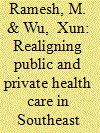

|
|
|
|
|
| Publication |
2008.
|
| Summary/Abstract |
This paper compares health policy trends in Indonesia, Malaysia, the Philippines and Thailand with the purpose of drawing usable lessons in reform. The study finds that governments in the region are rapidly privatizing the provision of healthcare at the same time as they are expanding the government's role in financing. The paper argues that expansion of public financing at the same time as private provision is misconceived as the combination would aggravate instances and severity of market failures peculiar to the sector. The dysfunctional trend is particularly evident in Indonesia and the Philippines. In Thailand, in contrast, the expansion of public financing has occurred in the context of a health system dominated by public providers, which has had the effect of restraining healthcare costs. Malaysia occupies a mid position between Indonesia and the Philippines on the one hand and Thailand on the other. All four cases underline the value of state capacity in designing optimal policies and implementing them effectively.
|
|
|
|
|
|
|
|
|
|
|
|
|
|
|
|
| 17 |
ID:
108442
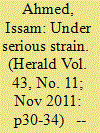

|
|
|
| 18 |
ID:
184192
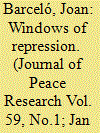

|
|
|
|
|
| Summary/Abstract |
What explains the great variation in the adoption, timing, and duration of government policies made in response to the COVID-19 pandemic? In this article, we explore whether government incentives to repress domestic dissidents influence their responses to the COVID-19 pandemic. We argue that COVID-19 containment policies are observationally equivalent to those that abusive governments use to limit domestic dissent – that is, policies that restrict citizens’ freedom of movement. This creates an opportunity for abusive governments to engage in repressive behavior without countervailing pressure from citizens and the international community. Following this logic, we expect abusive governments to be more likely to adopt restrictive policies, adopt them earlier in the course of the pandemic, and take longer to relax restrictions. Empirically, we find that governments that have recently engaged in state violence against civilians or abused citizens’ human rights were about 10% more likely to enact lockdown and curfew policies. Compared to less repressive countries, these policies were implemented approximately 48 days earlier in the pandemic and kept in place for approximately 23 days longer. Overall, our results advance our understanding of how the repressiveness of state institutions can shape policy responses to a global health crisis.
|
|
|
|
|
|
|
|
|
|
|
|
|
|
|
|
| 19 |
ID:
086645
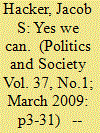

|
|
|
|
|
| Publication |
2009.
|
| Summary/Abstract |
What are the prospects for meaningful reform of U.S. health care? To answer this question requires understanding why previous reform efforts (and in particular the 1993 Clinton health plan) failed-the combination of deep structural biases against large-scale public provision and the inherited constraints posed by the rise of employment-based insurance. Generally, the context is more favorable today than it was fifteen years ago. But the prospects for change hinge on learning the right lesson of history: Politics comes first. Putting politics first means avoiding the overarching mistake of the Clinton reformers: envisioning a grand policy compromise rather than hammering out a real political compromise. It also means addressing the inevitable fears of those who believe they are well protected by our eroding employment-based framework. And it means premising political strategies on the contemporary realities of hyperpolarized politics, rather than wistfully recalled images of the bipartisan politics of old.
|
|
|
|
|
|
|
|
|
|
|
|
|
|
|
|
|
|
|
|
|